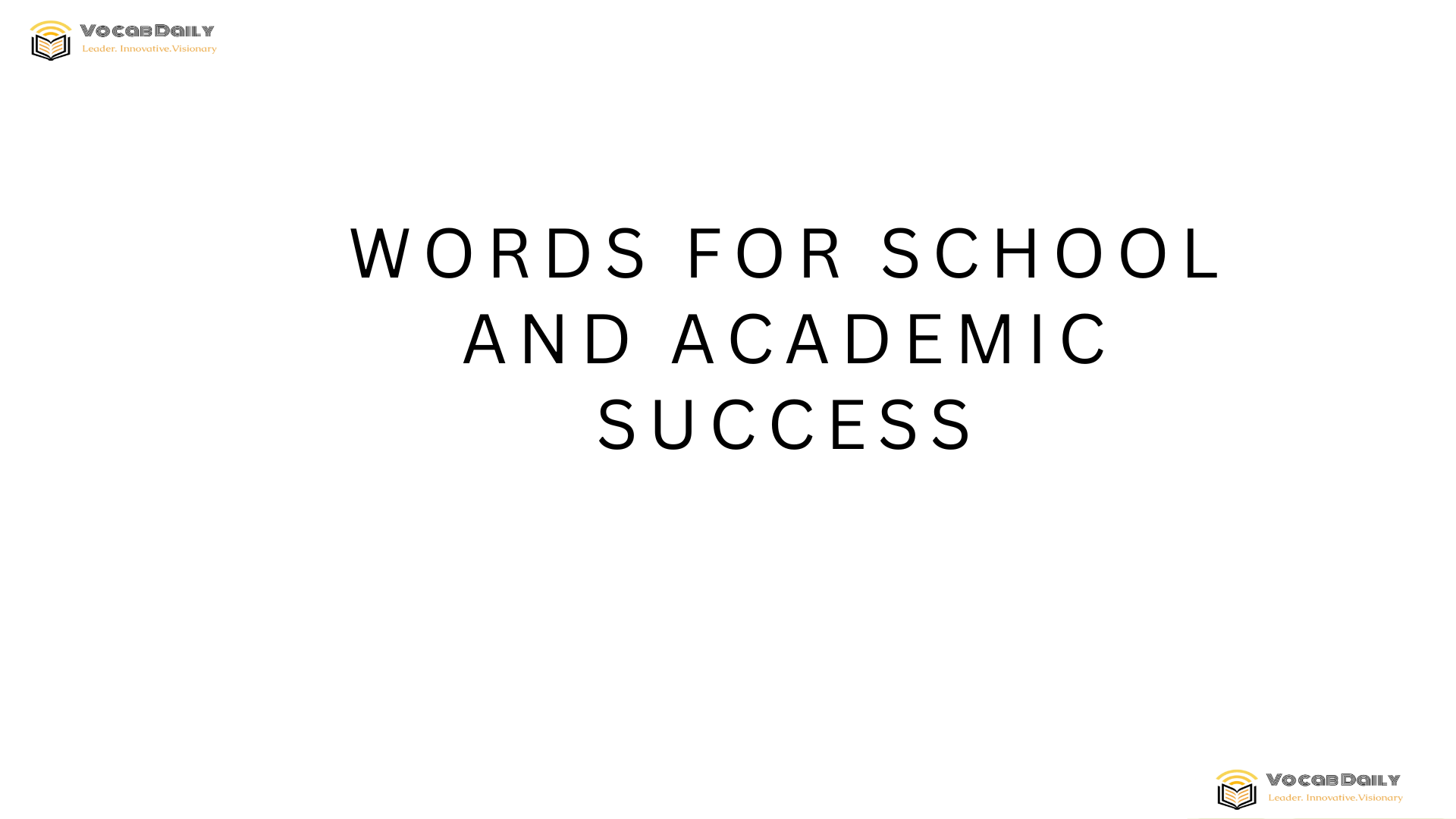Words for School and Academic Success
Essential Vocabulary for Students
Success in school and academics isn’t just about hard work and dedication; having the right vocabulary also plays a crucial role. Understanding and using academic vocabulary correctly can enhance reading comprehension, writing ability, and participation in class discussions. This article highlights important words that every student should know to excel in their educational journey.
Words Related to Learning and Studying
Learning effectively requires familiarity with key terms that describe different study methods and behaviors. Words like analyze, comprehend, memorize, and apply are vital when discussing academic tasks. To analyze means to examine information carefully, while comprehend means to understand something. Memorizing is the process of committing information to memory, and applying involves using knowledge in practical situations.
Other important terms include review, which means to go over material again, and summarize, meaning to give a brief statement of the main points. Incorporating these words into daily conversations and writing will strengthen academic skills.
Classroom-Related Vocabulary
The classroom environment comes with its own set of vocabulary essential for smooth communication and understanding. Words like assignment, lecture, discussion, deadline, and participation are often used in academic settings. An assignment is a task given by a teacher, a lecture is a talk or presentation on a subject, and a discussion is an exchange of ideas.
Deadline refers to the due date for submitting work, while participation means the act of taking part actively in class. Knowing these terms helps students navigate the classroom setting effectively.
Words for Academic Disciplines
Academic success often involves understanding specialized vocabulary related to different subjects. For example, in science, terms such as hypothesis, experiment, data, and theory are foundational. A hypothesis is a proposed explanation, an experiment is a test conducted to explore ideas, data refers to collected information, and theory is a well-substantiated explanation.
In literature, words like character, plot, theme, and genre are used frequently. Understanding these terms supports better interpretation and analysis of texts. Getting comfortable with discipline-specific vocabulary contributes to improved academic performance across subjects.
Test and Exam Vocabulary
Tests and exams are an inevitable part of school life. Being familiar with words related to assessments can reduce anxiety and make the process smoother. Words such as exam, quiz, multiple-choice, true or false, essay, and grade are essential for every student.
For instance, an exam is a formal test, a quiz is a shorter assessment, and multiple-choice refers to questions with several answer options. True or false questions require deciding if statements are correct, essays involve longer written responses, and grades indicate the level of achievement. Using these words accurately helps students communicate about their assessments.
Words That Describe Academic Skills
Some words describe the skills needed for success in school, such as critical thinking, creativity, collaboration, and time management. Critical thinking involves analyzing information logically and making reasoned judgments. Creativity refers to the ability to generate original ideas and solutions.
Collaboration is working effectively with others, and time management means organizing one’s time to complete tasks efficiently. Mastering and discussing these concepts can help students become more responsible learners and team members.
Motivational and Attitude Words for Academic Success
Academic success is often linked to a positive attitude and motivation. Words such as dedication, perseverance, discipline, self-motivation, and confidence describe qualities that help students overcome challenges and improve performance.
Dedication means committing oneself fully to a goal, perseverance is the continued effort despite difficulty, and discipline involves self-control and consistency. Self-motivation drives students to study without external pressure, and confidence boosts their ability to participate and take risks in learning. Using these words encourages a growth mindset and resilience.
Useful Phrases for Academic Communication
Besides single words, specific phrases can help students communicate clearly in academic settings. Phrases like take notes, ask questions, make a presentation, submit an assignment, and join a study group are common and useful.
For example, taking notes involves writing down important information, asking questions helps clarify doubts, and making a presentation means speaking about a topic to the class. Submitting an assignment refers to handing in work on time, and joining a study group means collaborating with peers for mutual benefit. Practicing these expressions is essential for effective academic interactions.
Advanced Academic Vocabulary
To stand out academically, students can also learn advanced vocabulary that appears in textbooks, lectures, and scholarly articles. Words like anecdote, bias, concept, evidence, implication, and methodology are examples.
An anecdote is a short, interesting story often used to illustrate a point. Bias refers to unfair preference, concept is a general idea, evidence means facts or information supporting a belief, implication refers to a conclusion that can be drawn, and methodology means the system of methods used in research. Incorporating these sophisticated terms into writing and discussions can elevate academic work.
How to Improve Your Academic Vocabulary
Developing a strong academic vocabulary takes time and practice. Reading extensively across different subjects is one of the best ways to encounter new words in context. Students should also keep a vocabulary journal to record and review new terms regularly.
Using flashcards and engaging with vocabulary apps can make learning enjoyable and effective. Moreover, using new words in sentences, essays, and classroom discussions helps reinforce understanding. Finally, seeking feedback from teachers and peers can aid in mastering proper spelling, pronunciation, and usage of academic vocabulary.
The Importance of Vocabulary in Academic Success
Vocabulary knowledge is one of the strongest predictors of academic achievement. Students with a broad and deep vocabulary can comprehend texts more easily, express their ideas clearly in writing, and perform better on exams.
Furthermore, strong vocabulary skills contribute to improved critical thinking and better communication, both essential for succeeding in higher education and beyond. Focusing on learning and applying the right academic words will empower students to reach their full potential.

Leave a Reply